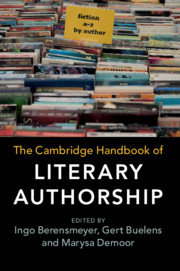Book contents
- The Cambridge Handbook of Literary Authorship
- The Cambridge Handbook of Literary Authorship
- Copyright page
- Contents
- Figures
- Contributors
- Acknowledgments
- Abbreviations
- Chapter 1 Introduction
- Part I Historical Perspectives
- Chapter 2 Authorship in Cuneiform Literature
- Chapter 3 Authorship in Ancient Egypt
- Chapter 4 Authorship in Archaic and Classical Greece
- Chapter 5 Authorship in Classical Rome
- Chapter 6 Conceptions of Authorship in Early Jewish Cultures
- Chapter 7 Modes of Authorship and the Making of Medieval English Literature
- Chapter 8 Manuscript and Print Cultures 1500–1700
- Chapter 9 The Eighteenth Century
- Chapter 10 The Nineteenth Century
- Chapter 11 Industrialized Print
- Chapter 12 Postmodernist Authorship
- Chapter 13 Chinese Authorship
- Chapter 14 Literary Authorship in the Digital Age
- Part II Systematic Perspectives
- Part III Practical Perspectives
- Select Bibliography
- Index
Chapter 10 - The Nineteenth Century
Intellectual Property Rights and “Literary Larceny”
from Part I - Historical Perspectives
Published online by Cambridge University Press: 07 June 2019
- The Cambridge Handbook of Literary Authorship
- The Cambridge Handbook of Literary Authorship
- Copyright page
- Contents
- Figures
- Contributors
- Acknowledgments
- Abbreviations
- Chapter 1 Introduction
- Part I Historical Perspectives
- Chapter 2 Authorship in Cuneiform Literature
- Chapter 3 Authorship in Ancient Egypt
- Chapter 4 Authorship in Archaic and Classical Greece
- Chapter 5 Authorship in Classical Rome
- Chapter 6 Conceptions of Authorship in Early Jewish Cultures
- Chapter 7 Modes of Authorship and the Making of Medieval English Literature
- Chapter 8 Manuscript and Print Cultures 1500–1700
- Chapter 9 The Eighteenth Century
- Chapter 10 The Nineteenth Century
- Chapter 11 Industrialized Print
- Chapter 12 Postmodernist Authorship
- Chapter 13 Chinese Authorship
- Chapter 14 Literary Authorship in the Digital Age
- Part II Systematic Perspectives
- Part III Practical Perspectives
- Select Bibliography
- Index
Summary
In his preface to Lyrical Ballads (1802), William Wordsworth claimed that the “poet binds together by passion and knowledge the vast empire of human society, as it is spread over the whole earth, and over all time.”1 This notion of the Romantic author as a transformational genius played a foundational role in the development of modern copyright, which defined the author as an individual who deserved special recognition and protection under the law. The Copyright Act of 1814 held that copyright rested with the author for twenty-eight years or the author’s lifetime, whichever was longer, and over the course of the century these rights were further extended and refined. Thomas Talfourd took up the cause for reform in 1837, putting forward a bill that was designed “to insure to authors of the highest and most enduring merit a larger share in the fruits of their own industry and genius.”2
- Type
- Chapter
- Information
- The Cambridge Handbook of Literary Authorship , pp. 147 - 164Publisher: Cambridge University PressPrint publication year: 2019



